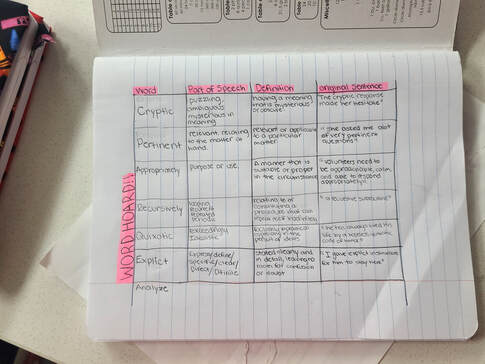"A child who reads will be an adult who thinks"
Word Hoard
As you read, you will keep track of all the vocabulary words you find that you do not know, but you will be held accountable for learning the following for at least three: the spelling, variation, definition, part of speech and affixes of each word. You will be expected to use your new vocabulary in essays and other writing, so make sure to underline or highlight them when you do for additional points. Make sure you include the page number on which you found the word.
**The only way you will really learn these words is to use them when writing and in conversation. So, I expect to see and hear these words used in the correct context in your written and verbal communications.**
***You are cheating yourself if you think you can learn the definitions for a test. The true test of your effort is when you've improved your vocabulary.***
**The only way you will really learn these words is to use them when writing and in conversation. So, I expect to see and hear these words used in the correct context in your written and verbal communications.**
***You are cheating yourself if you think you can learn the definitions for a test. The true test of your effort is when you've improved your vocabulary.***
Sample Word Hoard
|
Word/Part of Speech
Epistolary (epistle): adj.
|
Definition
Relating to or denoting the writing of letters or literary works in the form of letters.
|
Original Sentence
In college, I had an epistolary romance with my high school sweetheart until I realized we'd probably never see each other again.
|
Example (Lit., Film, Music)
The book, "The Color Purple," was written in epistolary form.
|
|
Homely (homliness): adj.
|
Unattractive in appearance.
|
Many celebrities go out looking homely and unattractive so fans and paparazzi won't recognize them.
|
In the movie, "Little Orphan Annie," Annie plays a homely looking orphan who is eventually adopted by a billionaire.
|
|
Diaphanous (Diaphanously): adj.
|
Flimsy.
|
Time made the paper so diaphanous the edges crumbled when I picked it up.
|
Cinderella wore a diaphanous gown to the ball.
|
